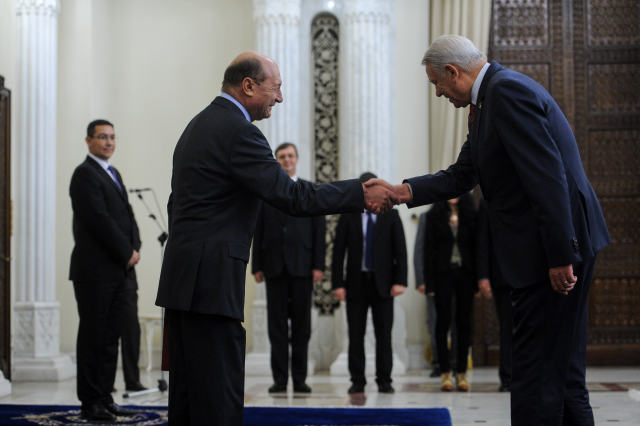The PM of Romania, Victor Ponta, has announced that the Finance Minister, Darius Valcov, resigned, but the resignation will take effect after the draft Fiscal Code and Code of Fiscal Procedure have been finalised, in a few days. Previously, the President of Romania, Klaus Iohannis, had asked PM Victor Ponta to initiate the procedure to dismiss the Finance Minister Darius Vâlcov. The latter is being prosecuted in a corruption case, for offences perpetrated when he was the mayor of the southern Romanian city of Slatina. According to prosecutors, the manager of a company contacted Vâlcov and asked for his support in securing public work contracts, in exchange for 20% of the contract value. The mediator of the deal was the incumbent mayor of Slatina, the Social Democrat Ninel Florin Prina, who has been detained in the case. The Opposition had also called for the resignation of the finance minister.
The Romanian minister for the diaspora, Angel Tîlvăr, had meetings last week with members of the Romanian communities in the Canadian cities of Ottawa and Toronto, the Foreign Ministry announced. Tîlvăr reiterated the interest of the Romanian authorities in developing and diversifying educational modules in the form of Romanian language and civilisation courses. In turn, the representatives of the diaspora suggested the set up of a Romanian Cultural Centre in Toronto, as a means to contribute to the conservation and promotion of the national identity.
The Romanian foreign minister, Bogdan Aurescu, will take part on Monday in Brussels in a meeting of the EU foreign ministers. The agenda includes the developments in Libya, the migration in the Mediterranean region, prompted by security concerns, and preparations for the Eastern Partnership Summit due in Riga on May 21-22. On the side-lines of the Foreign Affairs Council, a meeting will be held of the Group for the Republic of Moldova’s European Action, organised by Romania and France. The group is an informal ministerial mechanism launched in January 2010 at Romania’s initiative, and designed to provide a political platform for promoting Moldova’s EU accession aspirations. Minister Aurescu told the public radio station on Sunday that Romania continues to support the Moldovan authorities in their pro-European efforts, and tries to attract as many EU member states as possible in this process.
The Dutch Parliament does not support at the moment Romania’s Schengen accession, on grounds that Bucharest has not met all the original requirements for becoming an EU member. The statement was made by the Dutch Ambassador to Bucharest, Matthijs van Bonzel, in an interview to a private television station in Romania. He added that according to the Dutch Parliament, Romania joined the EU without meeting a number of key requirements concerning fields like legislation, the judicial system, efficiency and impartiality in law enforcement, and institutional corruption, and that the country is now catching up, reaching the level it should have reached in 2007. The Dutch diplomat added that there is a connection between the Schengen accession and compliance with the European standards.

